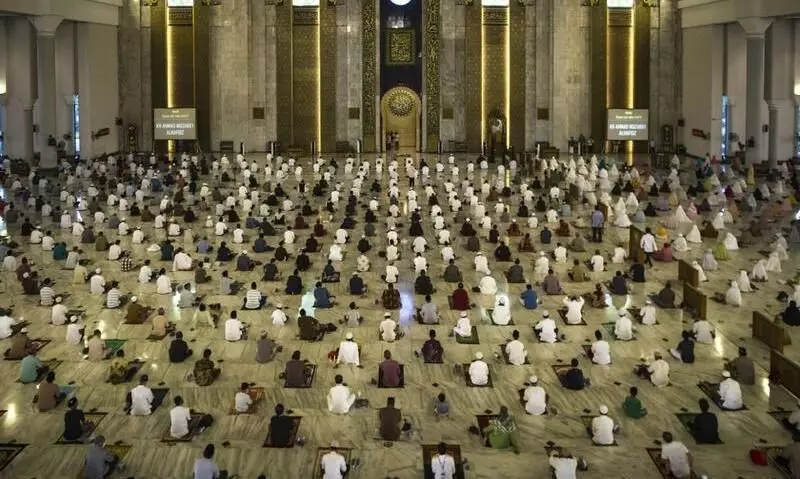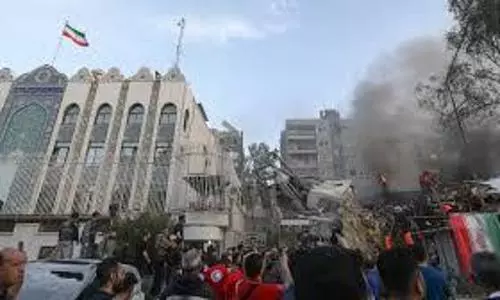

Why Eid celebration is so important to Muslims
text_fieldsOf all the religious communities in the world, perhaps it will be only Muslims who celebrate their two festivals of the year so passionately and with so much of adherence to its form. Folklore and local nostalgia apart, the basic structure of the festive rites of Eid have been followed through centuries all over the world in nearly untouched form. Why would it be so? And what factors does Eid Al-Fitr signify for the followers of Islamic faith?
Eid Al-Fitr, at the end of Ramadan, and Eid Al Adha which coincides with the pilgrimage of Haj are enjoined on, not just conventionally celebrated by Muslims, a fact that speaks for the stress Islam lays on addressing man's innate celebratory urge to rejoice over something he achieves in life. In the matter of Eid Al-Fitr which falls on the first day of the 10th Hijri month of Shawwal following Ramadan, the significance of celebration is clear through the manifestation of a few natural features among believers.
One: Muslims in general welcome Ramadan as a month of fasting and longer, deeper prayers than usual, remembrance of God and much more time spent on the recitation of the Holy Quran – and the very significance of the month is that Quran was revealed to Prophet during that month. All this for winning the pleasure of the Almighty. In addition, they develop a habit of refraining from evil in word and deed in all their daily interactions. As an act emphasised by the Prophet for the holy month to purify himself, he also performs extra prayers at night, in sublime solitude. Ramadan is also the month of repentance for the believer to seek pardon from God for his faults. All this gives him tremendous peace of mind and makes his soul prepared to suffer the rigours of life as mental equipment to answer the call of God and strive in the path of good. Eid marks the happy culmination of this.
Two: Despite this preparation to treat the month with respect, the onset of the month will herald a physical challenge in the minds of the believer, i.e, he has to spend a full month without food and sexual relations from dawn to dusk. As days pass by, his physique gets calibrated for this new routine and by the end of the month he even feels reluctant to part with that new course of life. That apart, while looking back, having achieved this physical and mental restraint of putting his action, thought and speech under control, all solely in answer to the call of Allah, is a signal achievement worth a celebration. And hence Allah asks him to have befitting festivity on a day, which is Eid.
Three: As a religion, Islam enjoins upon its people two days of festival, Eid Al Fitr and Eid Al-Adha. This principle is traced to a saying of the Prophet that all communities have their own festivals and these are the two prescribed for Muslims. If Eid Al Fitr marks the end of the Ramadan fasting, Eid Al-Adha is linked to the Hajj and to Prophet Ibrahim's readiness to sacrifice his son which however was commuted by God at the last minute to the symbolic sacrifice of a ram. And he performed that. Thus Eid symbolises the urge of man to have a share of life's enjoyment too.
Four: What makes the Eids distinct is also significant: neither of them is related to any person as such, birthday of any holy soul or the day of his death. Both carry huge significance in terms of man's relationship with God and humanity. In the case of the former, Ramadan makes man bring himself under a bodily restraint with abstinence from food and sexual activity, both allowed in normal times. The believer is also brought under restraint from evil words and thoughts which will nullify fasting.
Five: But in the culmination of Ramadan with a celebration, the devotee fulfils his obligation to fellow human beings. Here it takes on a social dimension. For, any Muslim, who has the means in excess of his own food for a day, is bound to donate a prescribed volume of foodgrain to the needy. This is to ensure that no member of the society is without food or celebration on that day. Sometimes, in the case of the destitute, even getting a meal will be a feast. This upholds Islam's stress on social obligation, making fellow members of community part of one's own celebration at the end of a month's fasting. More importantly, he is obliged to part with this before he makes the Eid special prayer in the morning.
This is part of worship. In fact Islam is the only religion that has firstly, made a celebration a part of religion and secondly, mandated another form of worship in the process of the celebration. This act of giving provision of food is called Zakat Al-Fitr (meaning charity for food).
Six: If fasting as such is a purely individual act, between man and God, and which no onlooker can outwardly recognise in another, by the time Eid arrives, it takes on an entirely community character. Right from the special morning prayer, recommended to be in open ground, to the get-gatherings of family and friends, the event marks social cohesion, goodwill and sharing pleasures.
Seven: Being human, a Muslim is engaged in numerous material activities and is open to influences good and bad. He goes through myriad transactions and vicissitudes of character oscillating between virtue and evil. As a result, he is likely to have fallen from lofty character and remembrance of God to the low of committing wrongs, grave or trivial. The month of Ramadan makes him go through a spiritually cleansing process and takes him closer to his Creator. Through the special focus on extra optional prayers at the serene pre-dawn hours, as practised by the Prophet, and through reading of the Quran - all with the sole aim of winning the pleasure of God - a Muslim's mind attains better purity – a kind of spiritual recharge unique for Ramadan. Hence the Prophet's saying that in Ramadan the gates of Hell will be closed and Satan locked up. The very atmosphere of the holy month facilitates it. This is a sense felt by even non-Muslims who by and large revere the traditions of the month and treat fasting Muslims with matching respect. When such a month ends with all its spiritual glory, ennobling of character and better proximity to God with a renewed determination to follow his commands, that really is something to celebrate. And Eid offers him nothing but that.
Due to Covid-related curbs, social jubilations are restrained now, but the spirit of celebration is bound to reverberate through the devotees, despite absence of visible festivities. Last but not the least: the very meaning of the Arabic word 'Eid' is festival and celebration.






















